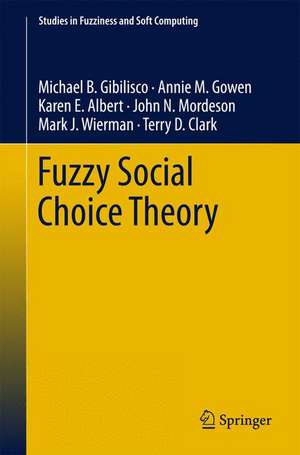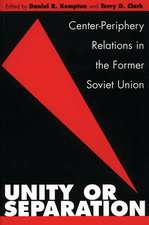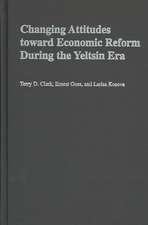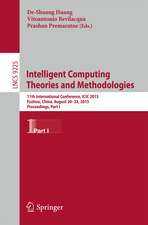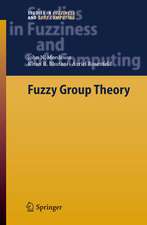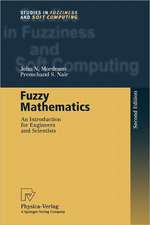Fuzzy Social Choice Theory: Studies in Fuzziness and Soft Computing, cartea 315
Autor Michael B. Gibilisco, Annie M. Gowen, Karen E. Albert, John N. Mordeson, Mark J. Wierman, Terry D. Clarken Limba Engleză Hardback – 7 mar 2014
| Toate formatele și edițiile | Preț | Express |
|---|---|---|
| Paperback (1) | 640.84 lei 43-57 zile | |
| Springer International Publishing – 3 sep 2016 | 640.84 lei 43-57 zile | |
| Hardback (1) | 647.13 lei 43-57 zile | |
| Springer International Publishing – 7 mar 2014 | 647.13 lei 43-57 zile |
Din seria Studies in Fuzziness and Soft Computing
- 20%
 Preț: 999.85 lei
Preț: 999.85 lei - 20%
 Preț: 653.06 lei
Preț: 653.06 lei - 20%
 Preț: 872.98 lei
Preț: 872.98 lei - 20%
 Preț: 930.57 lei
Preț: 930.57 lei - 20%
 Preț: 1051.00 lei
Preț: 1051.00 lei - 20%
 Preț: 992.44 lei
Preț: 992.44 lei - 20%
 Preț: 655.85 lei
Preț: 655.85 lei - 20%
 Preț: 1001.86 lei
Preț: 1001.86 lei - 18%
 Preț: 954.14 lei
Preț: 954.14 lei - 20%
 Preț: 330.10 lei
Preț: 330.10 lei - 20%
 Preț: 333.04 lei
Preț: 333.04 lei - 20%
 Preț: 997.56 lei
Preț: 997.56 lei -
 Preț: 391.61 lei
Preț: 391.61 lei - 20%
 Preț: 647.79 lei
Preț: 647.79 lei - 20%
 Preț: 986.01 lei
Preț: 986.01 lei - 18%
 Preț: 958.56 lei
Preț: 958.56 lei - 20%
 Preț: 996.40 lei
Preț: 996.40 lei - 20%
 Preț: 999.35 lei
Preț: 999.35 lei - 15%
 Preț: 646.43 lei
Preț: 646.43 lei - 20%
 Preț: 651.57 lei
Preț: 651.57 lei - 20%
 Preț: 997.89 lei
Preț: 997.89 lei - 15%
 Preț: 641.03 lei
Preț: 641.03 lei - 20%
 Preț: 1009.74 lei
Preț: 1009.74 lei - 20%
 Preț: 992.62 lei
Preț: 992.62 lei -
 Preț: 388.72 lei
Preț: 388.72 lei - 18%
 Preț: 1223.43 lei
Preț: 1223.43 lei - 20%
 Preț: 651.42 lei
Preț: 651.42 lei - 18%
 Preț: 951.59 lei
Preț: 951.59 lei - 18%
 Preț: 948.61 lei
Preț: 948.61 lei
Preț: 647.13 lei
Preț vechi: 808.91 lei
-20% Nou
Puncte Express: 971
Preț estimativ în valută:
123.87€ • 134.59$ • 104.12£
123.87€ • 134.59$ • 104.12£
Carte tipărită la comandă
Livrare economică 21 aprilie-05 mai
Preluare comenzi: 021 569.72.76
Specificații
ISBN-13: 9783319051758
ISBN-10: 331905175X
Pagini: 200
Ilustrații: XVIII, 185 p. 7 illus.
Dimensiuni: 155 x 235 x 20 mm
Greutate: 0.46 kg
Ediția:2014
Editura: Springer International Publishing
Colecția Springer
Seria Studies in Fuzziness and Soft Computing
Locul publicării:Cham, Switzerland
ISBN-10: 331905175X
Pagini: 200
Ilustrații: XVIII, 185 p. 7 illus.
Dimensiuni: 155 x 235 x 20 mm
Greutate: 0.46 kg
Ediția:2014
Editura: Springer International Publishing
Colecția Springer
Seria Studies in Fuzziness and Soft Computing
Locul publicării:Cham, Switzerland
Public țintă
ResearchCuprins
Fuzzy Social Choice.- Classical Social Choice Theorems.- Rationality of Fuzzy Preferences.- Arrow and the Aggregation of Fuzzy Preferences.- Characteristics of Strategy-Proof Fuzzy Social Choice.- Fuzzy Black’s Median Voter Theorem.- Representing Thick Indifference in Spatial Models.- Conclusion.
Textul de pe ultima copertă
This book offers a comprehensive analysis of the social choice literature and shows, by applying fuzzy sets, how the use of fuzzy preferences, rather than that of strict ones, may affect the social choice theorems. To do this, the book explores the presupposition of rationality within the fuzzy framework and shows that the two conditions for rationality, completeness and transitivity, do exist with fuzzy preferences. Specifically, this book examines: the conditions under which a maximal set exists; the Arrow’s theorem; the Gibbard-Satterthwaite theorem; and the median voter theorem. After showing that a non-empty maximal set does exists for fuzzy preference relations, this book goes on to demonstrating the existence of a fuzzy aggregation rule satisfying all five Arrowian conditions, including non-dictatorship. While the Gibbard-Satterthwaite theorem only considers individual fuzzy preferences, this work shows that both individuals and groups can choose alternatives to various degrees, resulting in a social choice that can be both strategy-proof and non-dictatorial. Moreover, the median voter theorem is shown to hold under strict fuzzy preferences, but not under weak fuzzy preferences. By providing a standard model of fuzzy social choice and by drawing the necessary connections between the major theorems, this book fills an important gap in the current literature and encourages future empirical research in the field.
Caracteristici
Presents a comprehensive analysis of fuzzy set theoretic models of social choice Paves the way for the development of a fuzzy social choice theory Includes applications of the described theory and encourage future empirical research in the field
